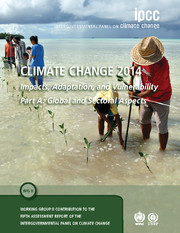 Climate Change 2014 – Impacts, Adaptation and Vulnerability: Part A: Global and Sectoral Aspects
Climate Change 2014 – Impacts, Adaptation and Vulnerability: Part A: Global and Sectoral Aspects Published online by Cambridge University Press: 05 January 2015
The Working Group II contribution to the Fifth Assessment Report of the Intergovernmental Panel on Climate Change (IPCC WGII AR5) considers climate change impacts, adaptation, and vulnerability. It provides a comprehensive, up-to-date picture of the current state of knowledge and level of certainty, based on the available scientific, technical, and socio-economic literature. As with all IPCC products, the report is the result of an assessment process designed to highlight both big-picture messages and key details, to integrate knowledge from diverse disciplines, to evaluate the strength of evidence underlying findings, and to identify topics where understanding is incomplete. The focus of the assessment is providing information to support good decisions by stakeholders at all levels. The assessment is a unique source of background for decision support, while scrupulously avoiding advocacy for particular policy options.
Scope of the Report
Climate change impacts, adaptation, and vulnerability span a vast range of topics. With the deepening of knowledge about climate change, we see connections in expanding and diverse areas, activities, and assets at risk. Early research focused on direct impacts of temperature and rainfall on humans, crops, and wild plants and animals. New evidence points to the importance of understanding not only these direct impacts but also potential indirect impacts, including impacts that can be transmitted around the world through trade, travel, and security. As a consequence, few aspects of the human endeavor or of natural ecosystem processes are isolated from possible impacts in a changing climate. The interconnectedness of the Earth system makes it impossible to draw a confined boundary around climate change impacts, adaptation, and vulnerability. This report does not attempt to bound the issue. Instead, it focuses on core elements and identifies connecting points where the issue of climate change overlaps with or merges into other issues.
The integrative nature of the climate change issue underlies three major new elements of the WGII contribution to the AR5. The first is explicit coverage of a larger range of topics, with new chapters. Increasing knowledge, expressed in a rapidly growing corpus of published literature, enables deeper assessment in a number of areas.
To save this book to your Kindle, first ensure no-reply@cambridge.org is added to your Approved Personal Document E-mail List under your Personal Document Settings on the Manage Your Content and Devices page of your Amazon account. Then enter the ‘name’ part of your Kindle email address below. Find out more about saving to your Kindle.
Note you can select to save to either the @free.kindle.com or @kindle.com variations. ‘@free.kindle.com’ emails are free but can only be saved to your device when it is connected to wi-fi. ‘@kindle.com’ emails can be delivered even when you are not connected to wi-fi, but note that service fees apply.
Find out more about the Kindle Personal Document Service.
To save content items to your account, please confirm that you agree to abide by our usage policies. If this is the first time you use this feature, you will be asked to authorise Cambridge Core to connect with your account. Find out more about saving content to Dropbox.
To save content items to your account, please confirm that you agree to abide by our usage policies. If this is the first time you use this feature, you will be asked to authorise Cambridge Core to connect with your account. Find out more about saving content to Google Drive.